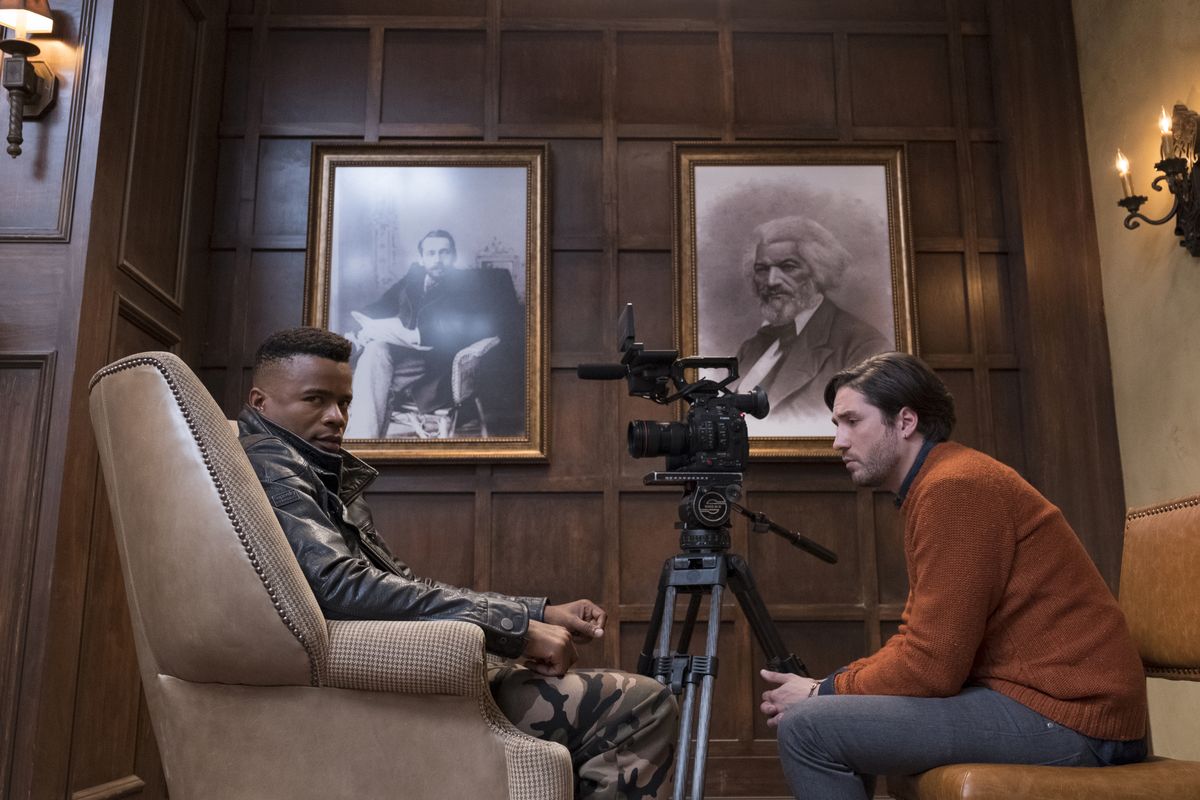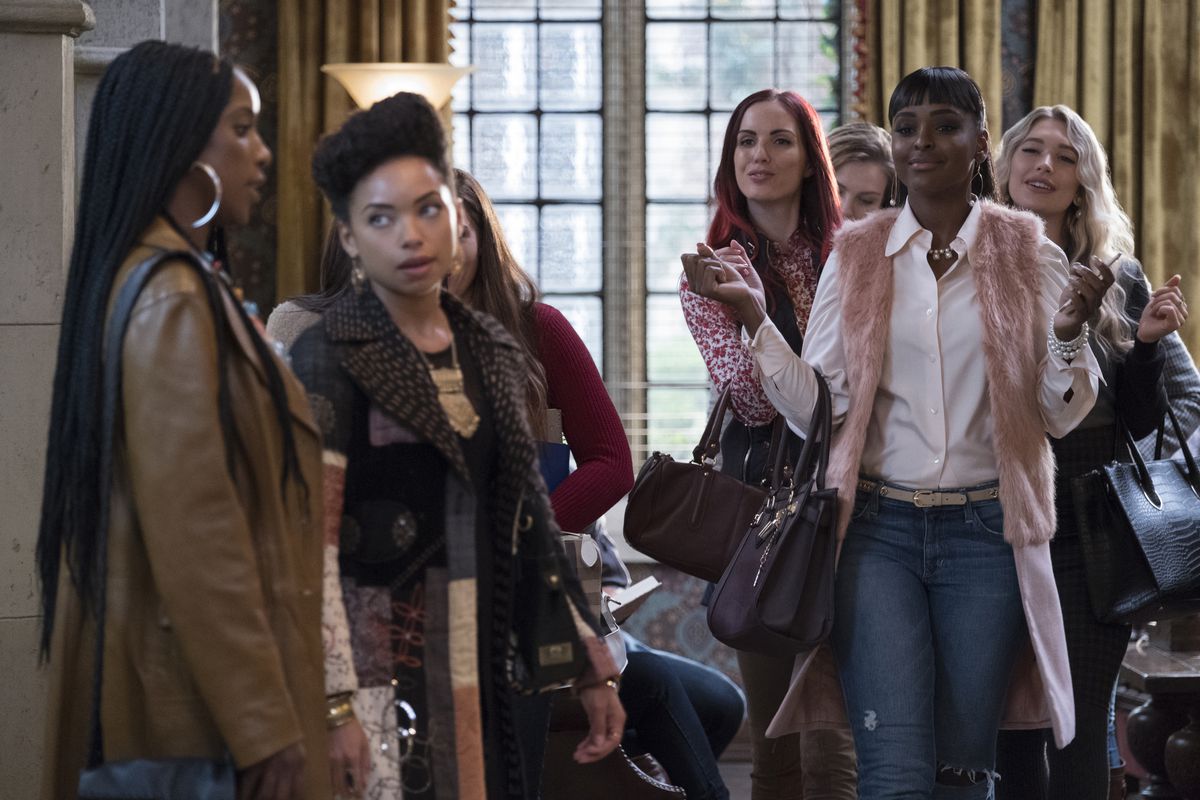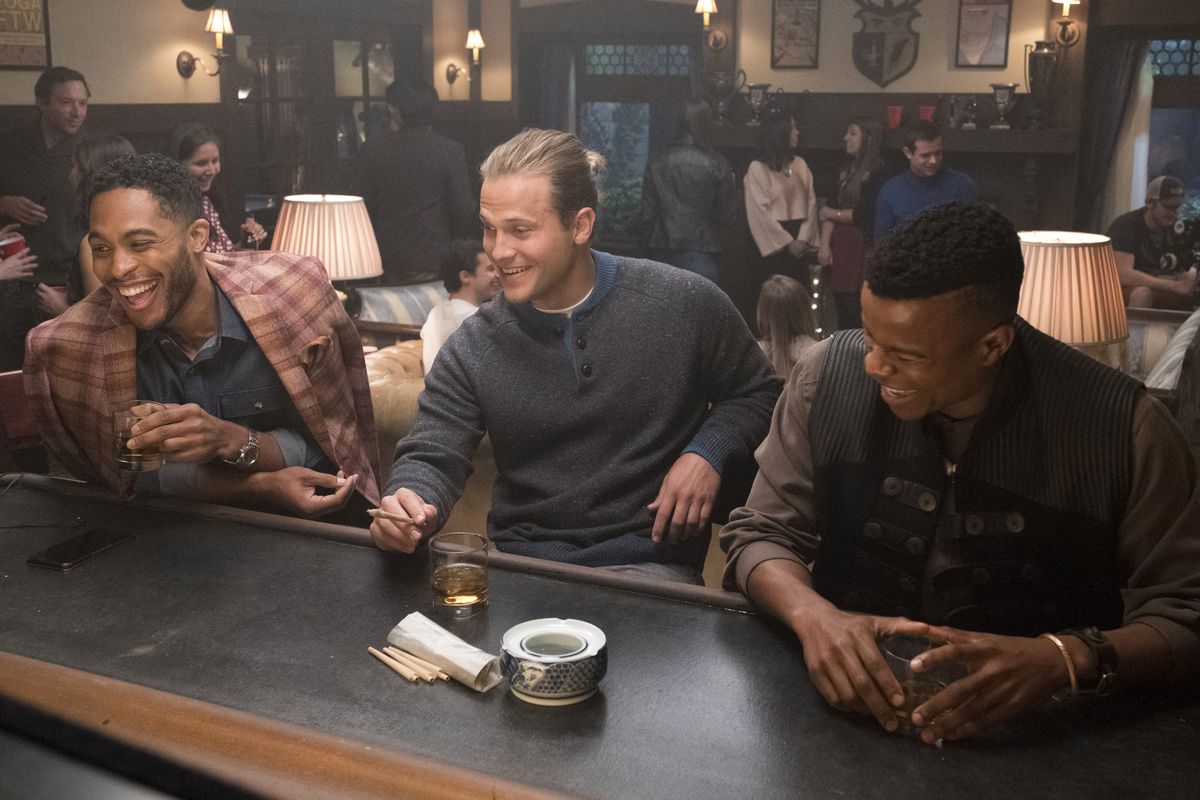In April 2017, when the first season of Netflix’s acclaimed Dear White People premiered, many critics and viewers remarked on how “timely” it was. After all, the half-hour series — which deeply explored topics such as racism, black identity, and the myth of the “post-racial” society — debuted just a few months after Donald Trump was sworn into office. Season 2, which premiered on Friday, May 4th, focuses largely on the resurgence of white supremacists, alt-right trolls on the internet, and the psychological effects of racial trauma. It’s sure to be heralded as just as timely — if not more. But the “timely” description also feels a little easy: when haven’t these subjects been timely within the black community?
Created by Justin Simien and based on his own 2014 film of the same name (a few actors even reprise their roles), the Dear White People series successfully mines laughs and introspection from topics that usually aren’t prominent on television, especially as lengthy story arcs. The first season was a delight, circling Winchester University students such as biracial radio host Sam (Logan Browning), her equally engaging but oft-relegated-to-sidekick best friend Joelle (Ashley Blaine Featherson), smart and charming activist Reggie (Marque Richardson), gay introvert and journalist Lionel (DeRon Horton), and put-together Troy (Brandon P. Bell), the dean’s son who winds up frustratedly smashing a glass door with a shovel.
Dear White People resonates because it’s adept at finding those little moments that feel like in-jokes to black viewers, and the ways we use humor to cope with living in a less-than-welcoming country. It transparently featured the microaggressions that come along with being the “only one” in a classroom, the alienation of being a black student in a predominantly white university, the toils of black activism, and the push-and-pull of straddling multiple worlds at once. Its long arc looked at simmering racial tensions on campus after a blackface party, and a major, heartbreaking turning point occurs in “Chapter V,” when a white campus security officer pulls a gun on Reggie at a party. The officer didn’t believe Reggie could actually be a student, regardless of the partygoers’ assertions, while the students were surprised that campus security even carried guns. They weren’t, however, surprised at how easily and quickly the gun was whipped out.
The conflicts eventually come to a head in the season finale, during a town hall meeting (naively held as an attempt to quell campus racial tensions) and a simultaneous protest. Season 2 reveals that a dorm fire occurred during the protest and was assumed to be rioting “because, you know, black people were involved,” Giancarlo Esposito dryly explains, as the series’ unnamed narrator. That dorm’s students are moved over to Winchester’s black house, Armstrong / Parker, and this integration becomes one of the new season’s focal points.
The season 2 premiere takes place just two weeks after the protest (and about three weeks after Reggie’s incident). The campus’ wound is still open, allowing the writers to probe the students’ minds while they’re still processing. Their emotions around the event are still raw, still simmering on the surface, and for some, still being mentally replayed over and over, as they try to find a different, better ending. The approach allows for a deeper examination of past events — but it also lets Dear White People’s creators correct a few minor missteps from the first season.

For one, although “Chapter V” introduced the necessary topic of police brutality through Reggie’s awful experience with campus police, the season’s remaining episodes didn’t explore the internal aftermath as much as they could have. We got the larger picture — shocked students, predictable debates, and the ripple effect on the higher-ups (and prominent donors) of Winchester, all of which culminated at the town hall meeting — but the show only briefly, lightly touched on exactly how this dug into Reggie’s psyche. Granted, the season had a lot packed into it (there’s a similar issue at play this time around, too) and there’s certainly something to say about how trauma sneaks up on people long after the inciting event. But the show’s initial brief look at the protest was still a concern.
In this season’s second episode, “Chapter II,” centered on Reggie (many of the episodes shine individual spotlights on characters), Dear White People begins to dig into the psychological ramifications of race-specific trauma. Throughout the episode, I kept thinking of Jenna Wortham’s 2015 New York Times interview with psychologist Monnica Williams about “race-based traumatic stress injury, or the emotional distress a person may feel after encountering racial harassment or hostility.” This “link between racism and post-traumatic stress disorder” immediately felt familiar, and its symptoms (which Williams says include depression, intrusive thoughts, anger, avoidance, and more) accurately described the aftermath of not only being “directly targeted by racial discrimination or aggression,” but also watching it secondhand on social media.

It becomes clear in “Chapter II” that Reggie is experiencing this race-based PTSD, and Dear White People smartly showcases it. Reggie has to undergo mandatory counseling, but as he wryly notes, the school should’ve given the security guard a shrink instead. Throughout the episode, Reggie (played brilliantly by the talented, charismatic Richardson) continues dealing with his trauma, suffering from nightmares, having flashbacks, and sometimes having a hard time controlling his anger. He can’t escape it; students regularly pity him, or tell exaggerated versions of the story that make Reggie feel even smaller.
At the same time, a few of Reggie’s friends are dealing with similar issues. Troy, back on campus after experiencing what it feels like to be thrown into the back of a cop car, doesn’t seem to have processed either. Instead, he grapples with his identity. As the narrator puts it, he’s gone from “goody-goody to good for nothing.” Pre-protest, many of Troy’s conflicts were rooted in trying to straddle the line of being black while also trying “to disarm white people.” (The pressure from his father, the university dean, didn’t help much.) Now, he says, “my own won’t trust me.” As Reggie puts it, he’s basically “the black guy in a white sitcom.” This season, Troy can’t figure out where he belongs: he’s no longer seen as the palatable-to-white-people student body president, he’s the black dude who pulled a Mookie. And he’s never really been committed to either image.
Figuring out his next moves on campus includes some trial and error, but his identity crisis mostly manifests in a lot of drinking, drugs, and sex — activities he pulls Reggie into as well, since Reggie is on his own mission to numb his brain.

Meanwhile, Sam spends much of the season facing her own racial trauma: an ongoing troll under the moniker “AltIvyW,” attacking Sam on a Twitter-clone social network. AltIvyW’s comments are the typical racist social media abuse: saying Sam only got into Winchester due to affirmative action, commenting on black-on-black crime, refusing to identify themselves because of black people’s rush to violence, personal insults about Sam’s biracial identity. The bullying expands to IRL, too: someone leaves a bunch of bananas on Sam’s dorm door with “bitch” written on them.
Sam becomes obsessed with fighting the troll, losing entire nights — weekends, even — to sitting in the same clothes, chugging energy drinks, and clapping back on Pseudo-Twitter for hours. Friends warn her not to take the bait, but Sam can’t seem to pull herself away from the hurtful comments. “Something’s changed,” she explains to Joelle. “Logic, reason, discourse — it’s out the window.” Since the protest — and, of course, since the real-life 2016 election — these racist trolls have only become more emboldened, outspoken, and confident. Just as we’re dealing with the real-life rise of alt-right personalities and unignorable Twitter accounts, Dear White People’s characters are in similar territory — so much so that a rival radio program called “Dear Right People” pops up in the series, with its participants parroting conservative soundbites.
As Monnica Williams mentioned, race-based stress can also be the result of witnessing racism on social media, from obsessively watching videos of police brutality to having racist comments flood your Twitter feed. In Sam’s case, she’s being specifically targeted, to the point where the attacks are affecting her daily life and academic performance.
In season 2 of Dear White People, the narrator has a recurring refrain: “Watch closely.” One of the season’s longer arcs is a mystery centered on Lionel’s investigation into secret societies on campus — and the racism that has plagued the campus throughout history — so both the audience and the show’s characters are meant to watch closely for clues that are dropped. But it appears that in season 2, the creators were smart enough to take their own advice, by taking a closer look at their characters’ internal conflicts. One criticism of season 1 was its treatment of Joelle, who fell into the trope of a dark-skinned woman rarely rising above sidekick status among her light-skinned best friends. Season 2 allows her to slowly become a true co-star, giving Joelle her own stellar episode and storylines. Coco (Antoinette Robertson) also gets standout moments that force her to look closer at her life and desires.
There are still some concerns in season 2 — like the first season, it packs far too much information and plot into 10 episodes (though that may be preferable to stretching it out over a longer season). The secret-societies arc doesn’t always work, and at times, it’s at odds with the rest of the plotlines. Overall, the second season isn’t as cohesive as it could be. But even the show’s messiness is endearing. It’s an encouragement to listen to that narration, to watch it all again… this time to watch even closer.
The 10-episode second season of Dear White People is now streaming on Netflix.
https://www.theverge.com/2018/5/4/17320358/netflix-dear-white-people-season-2-justin-simien-internet-trolls-racism-online-bullying

